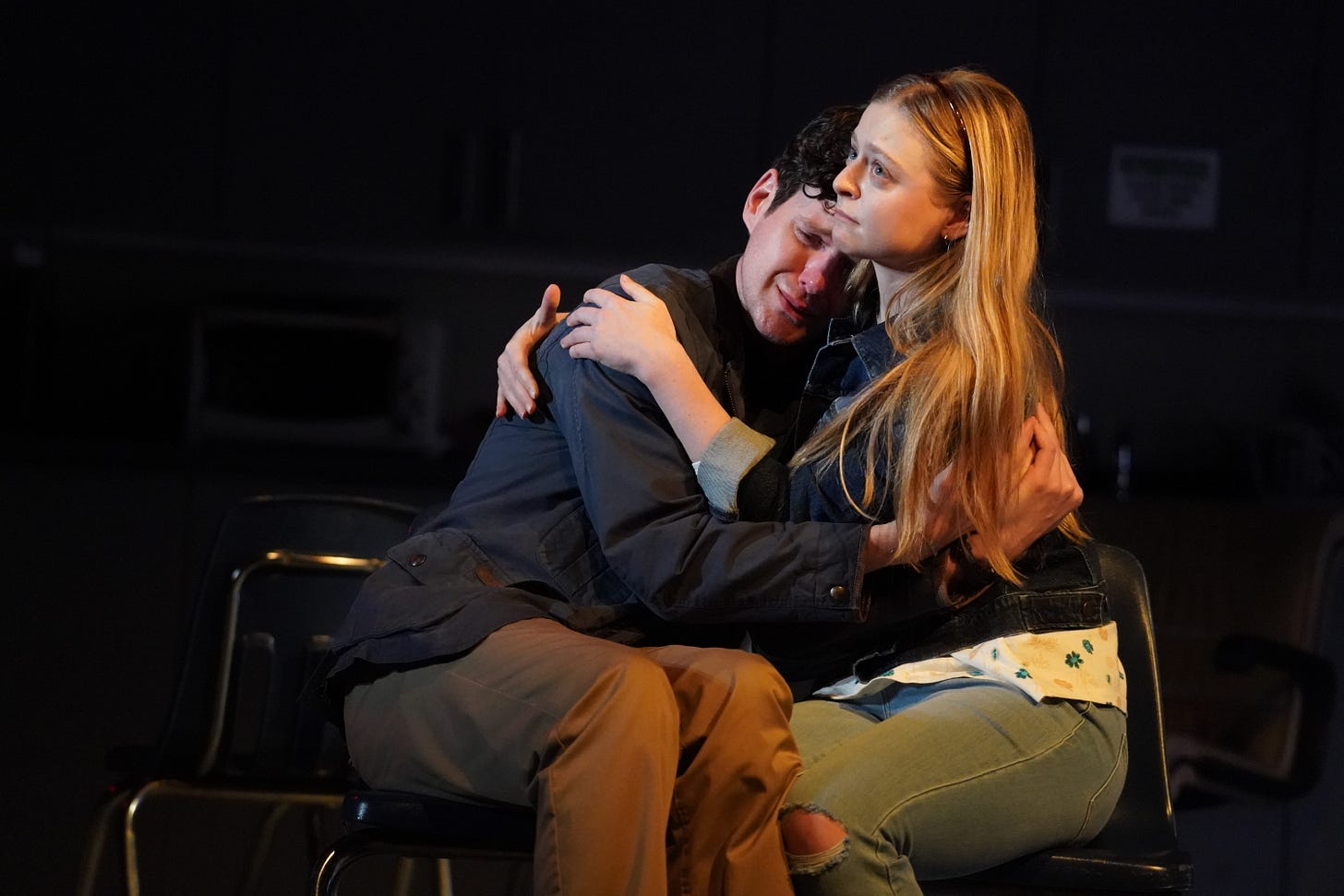Last week Tom and I saw A Bright New Boise, the first off-Broadway production of Samuel D. Hunter’s 2011 Obie-winning award play. Those outside the theatre world have most likely heard of Hunter as the writer of Darren Aronofsky’s The Whale, based on his play that had its off-Broadway premiere in 2012.
I originally put the previous sentence in parentheses, but actually, no, it’s important. The two plays run next to each other as apocalyptic stories, though not the kind that end the world. As I wrote last week, “apocalypse” means unveiling, drawing back the curtain to show what’s really beneath, and in a way that can constitute a cosmic reset button. I’ve written a little about The Whale, and what struck me most about it — and was largely ignored by viewers — was that it’s explicitly apocalyptic, set in a moment of national revealing and placed inside a personal revealing.
I knew from talking to Sam that A Bright New Boise was more explicitly about evangelicals, and as it happened, he’d just come from auditions when we met up in midtown that day. So he brought it up in our conversation:
I wrote a play right after The Whale called A Bright New Boise, which is very much, in my mind at least, a companion piece to The Whale. It’s about a father trying to reconnect with his son; the setup is there’s this guy who was involved in an evangelical church in north Idaho, and years ago had put up a kid for adoption and is now working at a Hobby Lobby in Boise where his son works, to try to build a bridge with his son.
But his problem is he can’t let go of the dogma. And so the on-the-ground relationship with his son is fundamentally in conflict with this constant voice inside. At the cost of every relationship in his life, he slides back into the dogma in a deeply tragic moment.
You can play it as a sermon on the mount, kind of like hellfire and brimstone. But I think he doesn’t want to say any of it. It’s incredibly painful for him to say it because it alienates everybody around him — but without it, his life doesn’t mean anything.
We went on to talk about the fear of becoming unmoored, of clinging desperately to something, and of certain voices in your head still sticking around long after you’ve learned how they’re not, really, about salvation or God at all.

But mostly I was waiting for that fire-and-brimstone moment he’d described for the whole play. I didn’t know how I’d react, because I knew I’d been that guy. I just didn’t know the context in which it would be delivered in the play. This week, I learned. The main character wasn’t involved in just any plain-vanilla evangelical church, but one of those end-of-days ones that everyone knows is basically a cult, except the people inside it. The kind that starts off euphoric, with the members feeling like they’ve rediscovered “true Christianity,” and ends, almost certainly, in tragedy of one kind or another.
I’d wager it feels especially recognizable for those of us who grew up in particularly kinds of evangelical contexts in the 1990s, when “authenticity” crossed with Left Behind fever and leftover Frank Peretti and Satanic panic vibes. What you wanted was something real — “relationship, not religion” — and what you got has often by now morphed into repressive political ideology, a continual need to be led by certainty and fear.
Perhaps the most striking moment in A Bright New Boise — a very good play, by the way, with a brilliant cast; I was holding my breath throughout — is when the main character, asked about that church, turns dreamy for a moment and remembers the early days, when they would all get together and share meals and lives and they felt like it all meant something. But by the end, they’re actively pleading with God to burn their city to the ground — that feeling of being the only right ones twists so quickly into fear and hate of the outsider (which can mean the Lutheran church down the road), masked as love.
“Well, that was traumatizing,” Tom remarked to me as we walked to the subway. Yes. Not in a bad way, but in the uncomfortable way that theatre is supposed to work — the stomach-sinking shock of recognition, of being seen and known, even if that’s not who you are anymore. The voices, after all, are still there, and they like to yell back at the stage. It’s an experience I’ve had a lot in New York’s theaters (from The Christians to Heroes of the Fourth Turning to most of the plays of Stephen Adly Guirgis) though, curiously, not really in productions designed for religious audiences. In a good play you can’t really just bang on about things without knowing them from the inside; these are turning the inside out.
But putting the darkness in the spotlight is uncomfortable. People don’t like it, sometimes, but there’s not much to art that doesn’t make you squirm.
Enjoyed this? If you’re feeling it, I won’t object if you buy me a cup of coffee. Writers need fuel.


